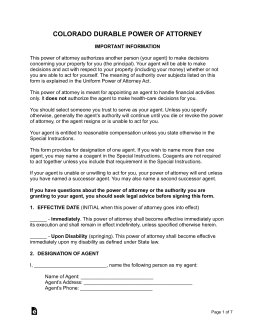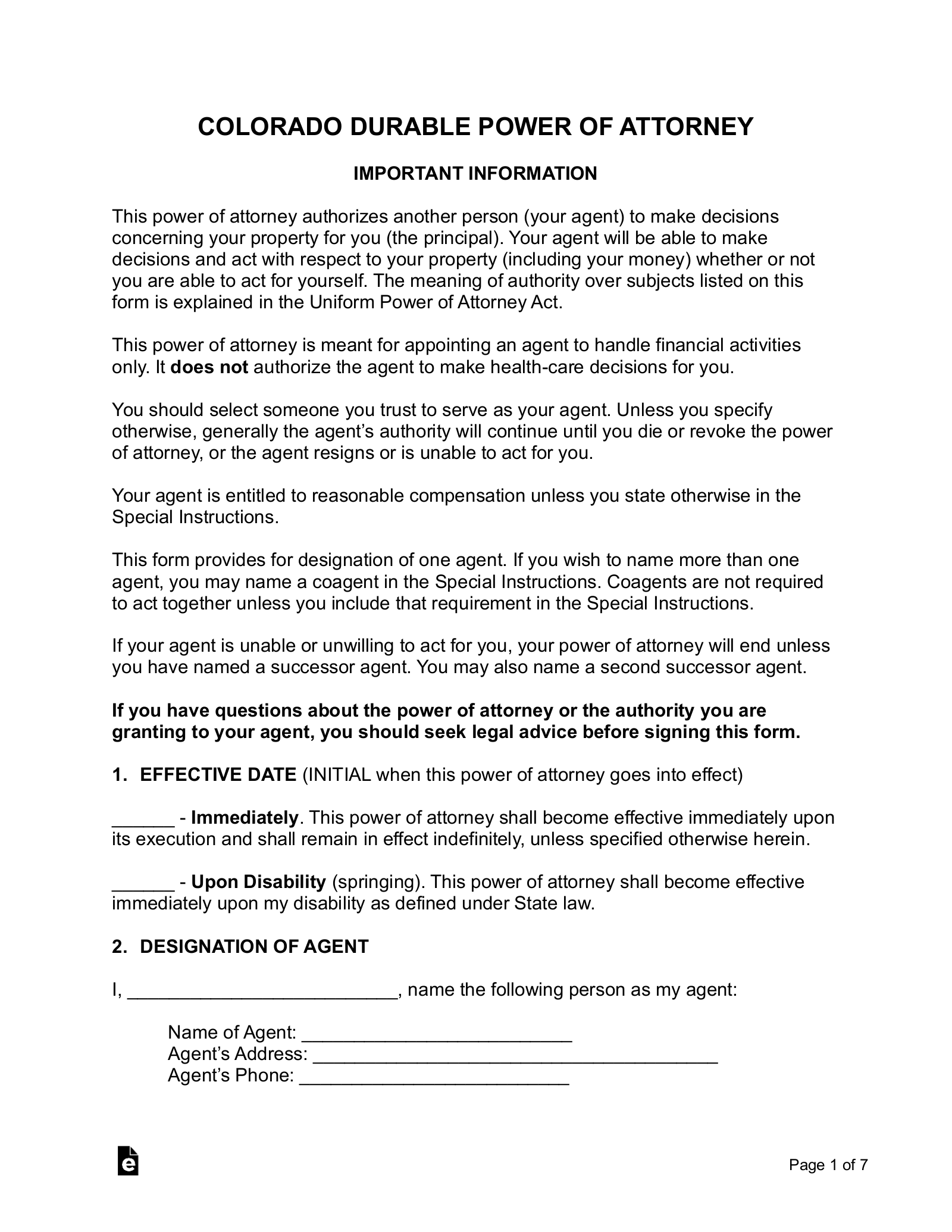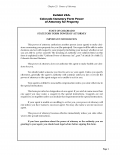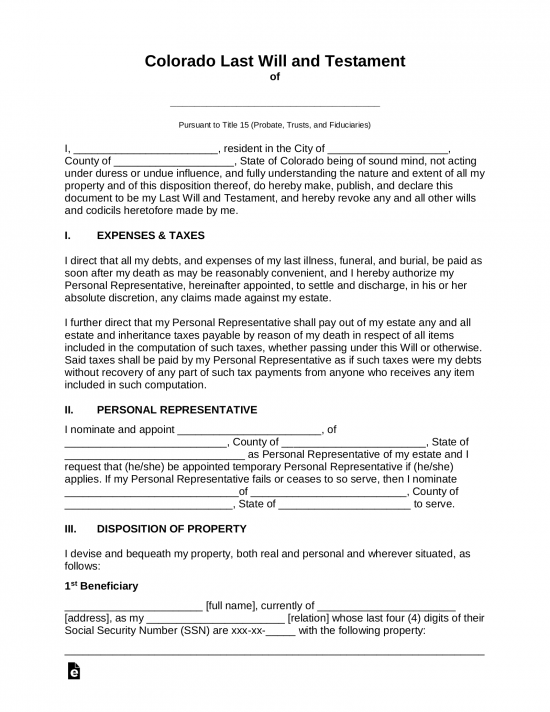Updated March 18, 2024
A Colorado durable statutory power of attorney form lets a person select anyone of their choosing to handle financial affairs on their behalf. The person selected as their agent will hold this title until the death of the principal unless revoked. After the form has been acknowledged before a notary public it may be used at any time by the selected agent.
Table of Contents |
Versions (3)
Download: PDF, MS Word, OpenDocument
Download: PDF
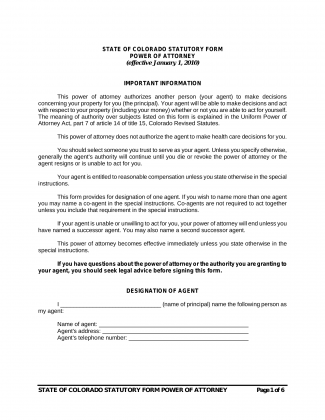 Colorado Land Title Guarantee Version
Colorado Land Title Guarantee Version
Download: PDF
Laws
Title 15, Article 14, Part 7 (Uniform Power of Attorney Act)
Definition of “Durable”
“Durable”, with respect to a power of attorney, means not terminated by the principal’s incapacity (§ 15-14-702(2)).
Definition of “Power of Attorney”
“Power of attorney” means a writing or other record that grants authority to an agent to act in the place of the principal, whether or not the term power of attorney is used (§ 15-14-702(7)).
Signing Requirements
The principal must sign the power of attorney in the presence of a notary public. In addition, the agent has the option to have their signature acknowledged on the Agent’s Certification to certify facts concerning a power of attorney (§ 15-14-705, § 15-14-742).
Statutory Form
Colorado does have a statutory form located at § 15-14-741 of the Colorado Revised Statutes.
How to Write
1 – Open The Required Form
The buttons positioned beneath the file image, on the right, will each lead to the file type version labeled on that button of this form. Open this form to work on it. It is suggested to download this form as well for future reference.
2 – Supply The Requested Information Regarding Relevant Parties
On the blank line below the heading “Designation of Agent,” record the Name of the Principal.
The next set of blank lines will require a report on the Agent’s Full Name, Complete Address, and Current Telephone Number. Supply this information in the appropriate areas.
The top of the next page will allow for two Successor Agents to be named, each one must have his or her Full Name Complete Address, and Telephone Number. These entities will be named in the order they will be contacted. A Successor Agent is an individual who will assume the Primary Agent’s role if necessary.
3 – Define The Authority Granted To The Agent
The list of subjects presents under the heading “Grant of General Authority” define the types of Authority that may be granted by the Principal to the Agent. Such powers may only be granted when the Principal initials the line preceding the named subject matter in this list. Any subject matter not initialed will be considered out of the control of the Agent or Attorney-in-Fact.
If the Principal wishes to allow the Agent to wield his or her Authority, then he or she must initial the blank space labeled “Real Property.”![]()
If the Principal will grant the Agent, Power regarding his or her Tangible Personal Property, then he or she must initial the second item.![]()
If the Attorney-in-Fact must wield Principal Authority regarding the Principal’s Stocks and Bonds, the third item will need to be initialed by the Principal.![]()
The Agent will have Principal Authority over the Principal’s Commodities and Options if the Principal initials the fourth item.![]()
The Agent or Attorney-in-Fact will be able to wield the same power as the Principal regarding the Principal’s Banks and other Financial institutions only if the Principal initials the blank space preceding the fifth item.![]()
The Principal may approve the Attorney-in-Fact’s Principal Power in the Operation of the Principal’s Entity or Business by initialing the sixth item.![]()
If the Principal requires the Agent to have powers in his or her Insurance and Annuities, then he or she must initial the seventh item.![]()
The Agent may receive Principal Power over the Principal’s Estates, Trusts, and other beneficial interests if the Principal initials the eighth item.![]()
If the ninth item is initialed by the Principal, the Agent will be able to assume Principal Authority over Principal Claims and Litigation.![]()
The tenth item will allow the Attorney-in-Fact to act with Principal Authority over the Principal’s Personal and Family Maintenance if the Principal initials it.![]()
The Attorney-in-Fact will be able to wield Principal Authority over the Principal’s Benefits (i.e. government programs, civil service, military, etc.) when the Principal initials the eleventh item on this list.![]()
The Attorney-in-Fact (or Agent) may assume Principal Powers over the Principal’s Retirement Plans if the twelfth item is initialed by the Principal.![]()
The Principal may approve of the Agent Wielding Principal Authority in his or her Tax Matters by initialing the thirteenth item.![]()
If the Principal wishes to grant all these Powers and Authorities to the Agent, he or she should only initial the last item on this list (and leave the rest blank).![]()
The next section of this document will define actions the Attorney-in-Fact may perform in the Principal’s Affairs with Principal Power. As with the previous section, this will be displayed in a list format with a blank line preceding each item of action. Only items bearing the initials of the Principal will be considered actions the Attorney may take on behalf of the Principal. Items left blank will not apply to the power being granted to the Attorney-in-Fact.
The Attorney-in-Fact will be granted the power to Create, Change, or Terminate the Principal’s Inter Vivo Trust if the first item in this list is initialed by the Principal.![]()
The Principal will need to initial the second item if he or she will grant the Agent the ability to Make a Gift.![]()
The Principal can grant the Agent the power to Create or Change Survivorship if he or she initials the third item.![]()
The ability to Create or Change a Beneficiary Designation will be given to the Agent if he or she initials the fourth item.![]()
If the Principal intends to grant the Agent the power to Authorize another person to wield authority defined in this document, then he or she must initial the fifth item.![]()
If the Attorney-in-Fact is to be allowed to Waive the Principal’s beneficiary rights on behalf of the Principal, then he or she must initial the sixth item.![]()
If the Principal wishes to grant the Attorney-in-Fact the right to execute fiduciary powers in the Principal’s Control, then he or she must initial the seventh item.![]()
The Principal must initial the eight-item if he or she wishes to grant the Agent the Power to Disclaim/Refuse/Release the Principal’s interests in properties or powers of appointment.![]()
If the ninth item is initialed the Principal will authorize the Agent to exercise powers of appointment excluding those to the benefit of the Principal’s interest and under the control Principal Control of the Agent or to make gifts that would be construed as a conflict of interest.
If the Attorney-in-Fact may utilize Principal Power, Right or Authority in a business (i.e. manager, partner, ltd, etc.) then mark the tenth item.
4 – Additional Instructions
The Principal may declare any additions or restrictions to the Powers that he or she wish applied to the Attorney-in-Fact’s Authority in the section titled “Special Instructions.” This is optional however, it is recommended Principals be as specific as possible when granting authority.
5 – Declaring a Nominee For Guardian
Next, the Principal may nominate a specific Conservator or Guardian to watch his or her interests if the courts deem the Principal must have an Appointed Guardian.
Below the words “Name of nominee for guardian of my person,” enter the Name of the Principal’s first choice for the Guardian. Below this, record this party’s Address and Telephone Number. There will be enough room to report two separate individuals.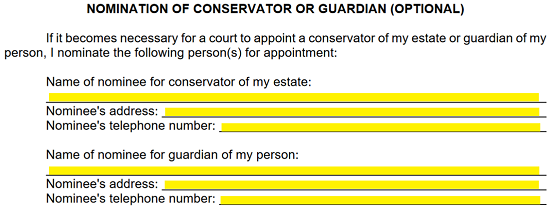
In the Signature and Acknowledgment Section, the Principal must sign his or her Name on the first line. Then present his or her Printed Name on the second line. The third and fourth lines will require the Signature Party’s Address and Telephone Number (respectively)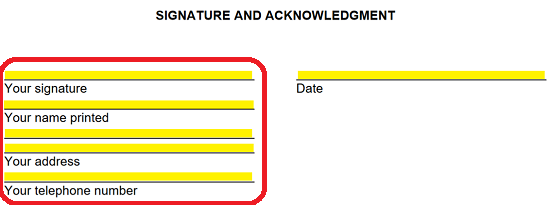
Once this has been accomplished the Principal will need to provide the Date he or she signed this document.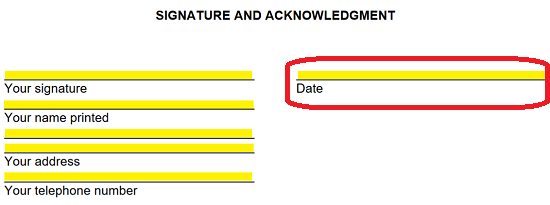
The next page will contain an area for the Notary Public to provide verification of this document’s signing by notarizing it. Only a Notary Public may satisfy the requirements of this page.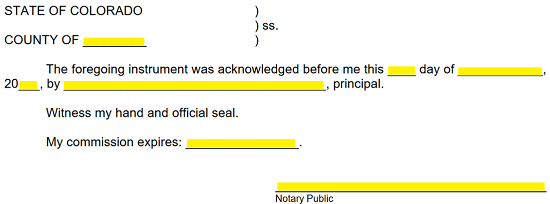
Related Forms
Download: PDF
Download: PDF, MS Word, OpenDocument

